Finding the cash for new TransitTech is often half the battle. Click through below to see nearly a dozen ways cities are funding new and growing on-demand public transportation networks.
The success of microtransit as an innovative public transit mode has reached all corners of the United States — NPR even visited our partner in Wilson, North Carolina, to learn just how their on-demand service has become “a big hit.” On-demand, tech-enabled transportation can offer efficient point-to-point service where no other transit mode exists, replace fixed routes that simply aren’t operating at a level to justify their costs, and fill first- and last-mile gaps in transit networks.
As a city official or transit agency employee, you probably know all of this. You may even be planning a microtransit pilot as we speak. But you might not know how to stand up a microtransit deployment yourself — let alone fund it. Many cities like Wilson leverage TransitTech providers to not only provide software, but also take on the operations: this is often called a “turnkey” service model. Transit agencies can also leverage this software + operations model — either in perpetuity, or as a way to get a pilot program off the ground quickly before determining the long-term operational plan.
But that still leaves the funding piece unanswered. Fortunately, cities and agencies in the US can and do utilize local, state, and federal funding in addition to fare revenue to support a turnkey on-demand service. Click below for a primer on the range of funding sources available.
And to give you some inspiration on where to start, we highlighted 10 cities across the country who have found innovative ways to build and grow microtransit services. Click through below!
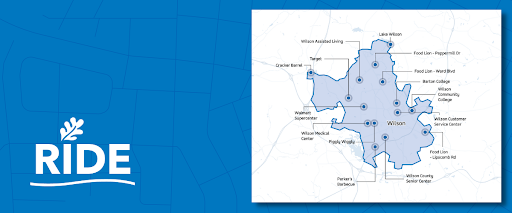
1. Formula funds and federal innovation grant: RIDE in Wilson, NC.
In 2020, the City of Wilson, North Carolina partnered with Via to launch a microtransit service, RIDE, to replace the City’s fixed route bus network after COVID-19 decimated ridership. Initially, the City funded the service with the same mix of local and rural formula funds (5311) they had used for the fixed-route network. In 2021, they collaborated with Via to craft a winning proposal to the FTA’s Accelerating Innovative Mobility (AIM) grant, which they used to expand service hours to more effectively meet the needs of second- and third-shift workers. As a recipient of this grant, Wilson became a member of the inaugural class of AIM Incubators, described as “a national network of innovative transit agencies that test new mobility solutions and broadly share the results with industry.”
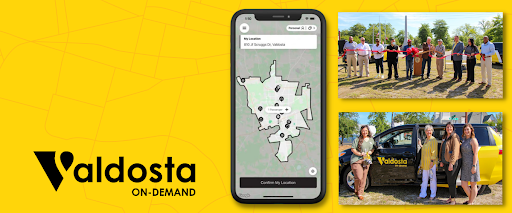
2. Formula funds: Valdosta On-Demand in Valdosta, GA.
Valdosta On-Demand launched in April 2021 and saw early success with high demand from local residents. The city utilized CARES Act funds to cover the cost of the initial one-year pilot and then secured FTA 5307 formula funds to support the long-term sustainability of the program. To learn more about how to access formula funds, see our blog post here.
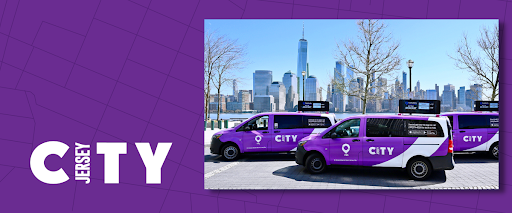
3. City budget and public-private grant for electric vehicles: Via Jersey City in Jersey City, NJ.
Jersey City leverages a variety of different funding sources to sustain and expand its popular services. This includes funding from the city budget as well as competitive public-private grant programs such as a recent award from the Volkswagen Environmental Mitigation Trust eMobility program which funds projects that counteract the impact of harmful emissions, including electric rideshare programs.
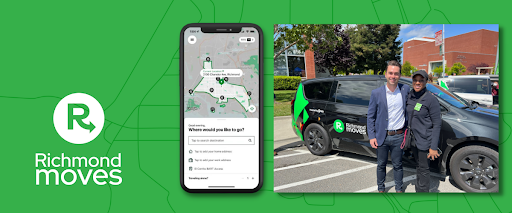
4. State EV-focused grant: Richmond Moves in Richmond, CA.
Richmond Moves’s goal is to fill gaps in the transportation ecosystem, which has historically lacked intra-city transit options and been challenged by heavily polluted air. To underscore the City’s commitment to sustainability, the fleet includes all plug-in hybrid electric vehicles, reducing energy consumption. The service is funded by the Clean Mobility Options (CMO) Voucher Pilot Program and is part of California Climate Investments, a statewide initiative putting billions of cap-and-trade dollars to work reducing greenhouse gas emissions, strengthening the economy, and improving public health and the environment, particularly in disadvantaged communities. CMO is administered by CALSTART, Shared-Use Mobility Center, and Local Government Commission.
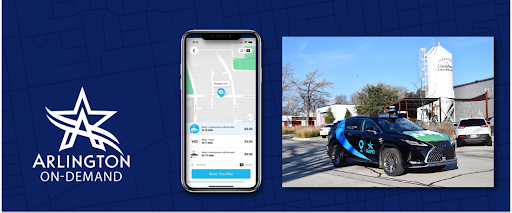
5. Formula funds and federal innovation grant: Arlington On-Demand in Arlington, TX.
The City of Arlington initially utilized Job Access and Reverse Commute (JARC) formula funding to launch and sustain its service, and now utilizes FTA 5307 formula funds to pay for its citywide expansion. In addition, the City has innovatively expanded its services to capitalize on more funding, launching one of the country’s first on-demand autonomous vehicle services which was funded by the FTA’s Integrated Mobility Innovation Grant in 2020.
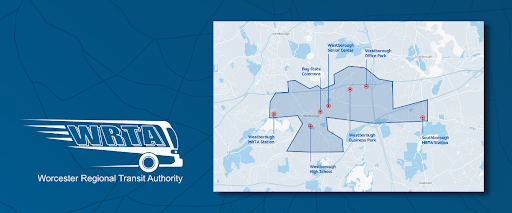
6. State policy-focused grant: Via WRTA in Westborough, MA.
Though several states offer transportation grants specifically for innovative transit services, others offer grant programs focused on policy objectives — like reducing greenhouse gas emissions or increasing access to jobs — that can be furthered by introducing new transit options. The Rail and Transit Division of Massachusetts Department of Transportation provided $4.2M in grants in 2020 for “projects aimed at meeting workforce transportation needs around the Commonwealth.” Through this program, the Worcester Regional Transit Authority (WRTA) in Westborough, MA received a $460,000 grant to help launch a Via-operated on-demand shuttle service.
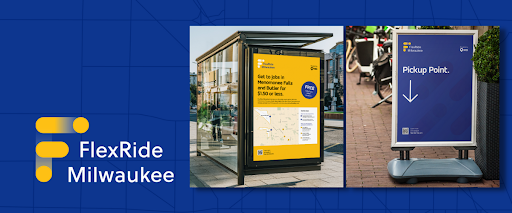
7. Federal research-focused grant, public-private state-based grant: FlexRide Milwaukee in Milwaukee, WI.
The Southeastern Wisconsin Regional Planning Commission (SWRPC) partnered with the University of Wisconsin at Milwaukee to pilot the city’s FlexRide service. Awarded $1 million through the 2021 Civic Innovation Challenge, Flexride is a research-based program that tests the viability of employment transportation for workers in various regions through the city of Milwaukee. The Civic Innovation Challenge is sponsored by the National Science Foundation and the U.S. Departments of Energy and Homeland Security. Leveraging this initial funding to launch the service, SWRPC recently partnered with MobiliSE to secure a $4.2 million multi-year grant from the Wisconsin Economic Development Corporation to expand the service in the years to come.
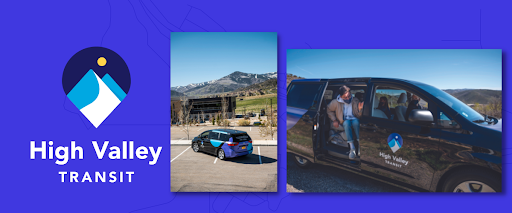
8. Transit-focused ballot measure: High Valley Transit in Summit and Wasatch Counties, Utah.
In June 2022, the Wasatch County Council in Utah voted 6-1 to approve a 0.25% sales tax increase in order to expand transportation options in a region with minimal options. Key to the measure’s approval was the example of neighboring Summit County’s microtransit service, which has expanded transit access to areas impractical to reach by bus. The measure is intended to fund an expansion of High Valley Transit’s service into Wasatch County.
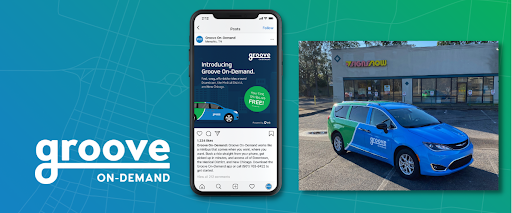
9. Joint funding from transit agency and business improvement districts: Groove OnDemand in Memphis, TN.
In February 2021, Memphis’ Groove OnDemand service relaunched as a fully on-demand microtransit service covering the downtown core, New Chicago, and Mud Island neighborhoods. The Downtown Memphis Commission and Memphis Medical District Collaborative, two community development organizations, banded together to transform the old Groove — a fixed-route shuttle to the medical district — into a cutting-edge on-demand service. They worked with the Memphis Area Transit Authority (MATA) to fund the service, and now, the tri-agency collaboration resulted in a service that not only provides job connections, but erases a former transit desert in the New Chicago neighborhood. All three agencies now collaborate on future service expansion and funding efforts.
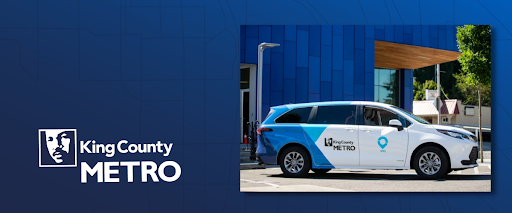
10. Federal innovation grant and formula funds: Via to Transit in Seattle, WA
King County Metro launched their successful first- and last-mile microtransit service after winning funding through the FTA’s Mobility on Demand (MOD) Sandbox Program. After proving the concept and expanding the service zones, the agency now uses FTA 5307 formula funds to support the long-term sustainability of the program.
See funding alerts here and click here to receive our newsletter, with new funding alerts included every month.




